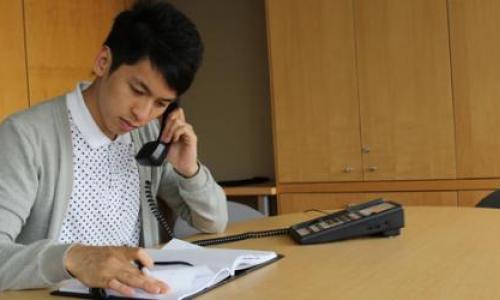One of the most important aspects of a career fair you do not want to miss out on is the possibility of creating a meaningful connection (or a few) with organizations attending the fair. After all, just handing in a resume at the fair without building prior rapport is not going to provide much of a lasting impression. So, here are six key tips to keep in mind when creating a connection with an organization at a career fair.
Plan Who You Want to See
It’s inevitable – there will be a lot of other students and young alumni attending the fair other than you. That’s why it is important to look at who’s going to be there before the fair and then narrow down who you really want to meet. Doing so allows you to target specific individuals and also enables you to initiate meaningful connections that you care about. Though if something grabs your attention at the fair that you hadn’t planned on visiting from before, go ahead and take the opportunity to find out more about that organization. Exploring options is what a career fair is all about anyway.
Keep Your Documents Updated
Of course, you want to leave a lasting impression on the person you’re connecting with. However, before you do so, you will want to make sure your resume, LinkedIn profile, etc. -- anything related to your professional presence online or offline is updated with all of your most current experience. Updating your information also means you have documents that can be submitted for opportunities that you are interested in outside of the career fair, thereby accomplishing two tasks in one go.
Develop an Introduction
You most likely don’t want to just go to an organization’s table and start handing out resumes like election pamphlets. Rather, you want to develop a relationship with them before handing over any documents and let the individual know who you are. So, you’ll want to prepare some type of introduction about yourself that includes who you are, perhaps why you’re interested in the organization, the field, and what you might contribute (not all in one breath of course!). You can find some useful tips here.
Bring Questions
Once you’re at the organization’s table, you’ll want to make the most of your time there. After you’ve done the introduction so that the other person knows who you are, it’s time for the real meat and potatoes. Ask open-ended questions and avoid ‘stock’ questions like “what does your company do” since you could easily obtain that information online. This is your chance to get to know more about the field or organization you want to work in, so you want to be specific in what you ask. Some examples of these questions could include: how the individual came to be in their position, their educational background, what they like about their work, their organization’s responsibilities, and other effective questions. Remember to ask for their advice if you have questions for that field – they will often have a helpful amount of insight. If you need some assistance with regards to what questions to ask, check out this website to assist you.
Be Patient
Similar to your large first-year lectures, there are going to be a lot of people at the fair looking for ways to connect with organizations and browsing for opportunities. Even if you have to wait at a table for a while to talk to the organization, don’t be discouraged. Come back later, or wait patiently while the person ahead of you is talking. Don’t fret if you don’t meet with an organization’s representative you really wanted to speak with at the fair – there are other ways to build connections. One way is to do an informational interview; find out more here.
Follow Up
Perhaps you didn’t get as much time as you would’ve liked to with different organizations at the fair. Or, maybe you want to further build a connection you established at the fair. The best way to do either is to follow up with the individual you talked to. You can do this by sending a simple thank you email, which demonstrates your willingness to go the extra mile, and possibly stand out from other attendees at the fair. If you don’t have a way to contact the individual after you have talked to them at the fair, don’t be afraid to ask for their contact info. It’s perfectly acceptable to do so.
Closing Thoughts
Career fairs can be stressful experiences. But, if you are prepared, you’ll feel more confident. And, you may take solace in the fact that many organizations know that you may be nervous. Keep the above points in mind when attempting to create a connection and you should do great. Think of it as a learning experience – each new connection you make is a step in the right direction. Best of luck with your next connection!
Beyond the Blog
-
Don't miss SFU's premier networking event. The annual BIG Fair takes place each September. For more information visit the BIG Fair homepage.














